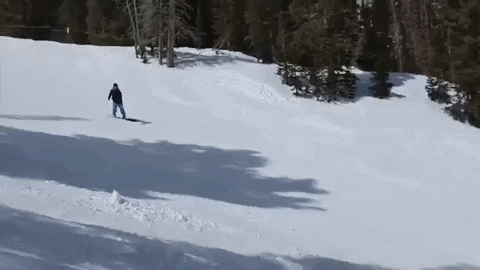Skiing versus snowboarding is an age-old debate, and no one will ever agree on one! Both are very different sports that come with their own challenges.
If you've ever talked to anyone who enjoys sports, you've probably heard the saying: "Skiing is easier to learn but harder to master, and snowboarding is harder to learn but easier to master." While different people will take to certain sports better than others, this saying is generally true. So, in the debate of skiing versus snowboarding, the answer is a little more complicated than one or the other.
In skiing, the beginning technique can be broken down into a modular approach but perfection will require extreme technicality. With snowboarding, the main focus is getting on your edges. This is the most difficult part, but once you've nailed it you can reach an impressive level of skill pretty quickly.
At the Beginning:
For the first week or so, skiing versus snowboarding is an easy comparison—skiing is significantly easier. This is mostly due to skiing being more intuitive for beginners for two main reasons:

Courtesy of Piqsels
Leg Position:
When skiing, your legs remain separated. This means that if you start to fall, you can throw a leg out to help rebalance yourself. In contrast, snowboarding requires both your feet to be attached to one board, which can feel awkward. If you start falling, you're going down no matter what.
Body Position:
Skiing is done in a straight-on stance. You have complete peripheral vision and can see exactly where you're going and what's going on around you. On the other hand, the snowboarding stance is side-to-side and leaves you with less peripheral vision.
After the Basics
For snowboarders:

Courtesy of GIPHY
Once the obstacles of leg and body position are dealt with and adjusted to, snowboarders can progress relatively quickly. The positioning of both legs on one board can actually be an advantage over skiers, who can cross skis and lose balance or crash. Once beginner snowboarders have learned how to turn—first turn shoulders, which turns hips, which turns ankles and feet, which turns board—they can hit the proper slopes right away. For most beginners, the basics of staying upright and turning are usually achievable within a week or two. Then, you can focus on increasing speed, improving turns, and finessing your riding.
For skiers:

Courtesy of GIPHY
For skiers, the hard work stops after the first few days. It's likely to take a lot longer to build up the basic level of skill. Having two separate skis starts off as a huge benefit, but starts to become a problem as you progress, because moving both legs simultaneously and in harmony can be hard to achieve.
Beginner skiers start off with two basic positions. The first is snowplow, otherwise known as "pizza," which puts the front tips of the skis together and tails of the skis apart. The other is straight skis, also called "French fries," which is when both skis are pointed forward. Then, you must learn the snowplow turns which uses the snowplow to push one ski outwards, causing a turn in the opposite direction.
Unlike the quick progression of snowboarders, skiers who progress past the snowplow turn by the end of the first week are doing remarkably well. While the progression is more difficult and technical, when you do begin to master the red and blue runs, you'll find a sport that continues to challenge your technique and skill. Mastering skiing is incredibly rewarding because of its difficulty.
Fitness
Both sports require you to be in pretty good shape. To begin with, skiing is more demanding on the legs and thighs, while snowboarding tends to need more core strength. If you're planning on taking up skiing, a sport like cycling is a good option to prepare your legs. For snowboarding, core strengthening exercises like pilates and simple crunches will help you keep yourself upright and avoid injuries.

Courtesy of GIPHY
Many people who take up snow sports quickly become addicted. As far as addictions go, this is a pretty good one to have! There's also the occasional sting of discouragement felt when falling down or comparing yourself to other skiers and snowboarders. Don't compare your beginner level to their advanced skillset. Remember, they had to start somewhere, too! If you fall, just get back up and keep on going. Besides, at the end of the day, you went up a mountain, inhaled fresh alpine air, and made some wonderful memories!
Which sport do you prefer? Let us know in the comments!
